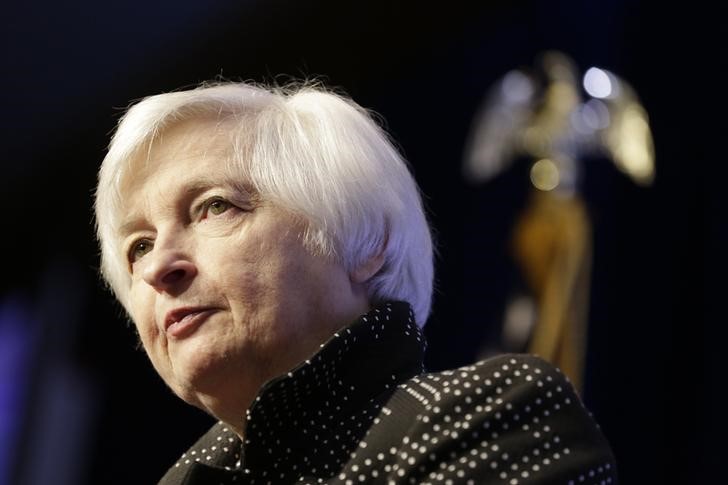By Howard Schneider and Jason Lange
WASHINGTON (Reuters) - Federal Reserve Chair Janet Yellen, speaking the day before a key employment report, said on Thursday the U.S. economy needs to add fewer than 100,000 jobs a month to cover new entrants to the workforce, setting an implicit floor for the jobs growth policymakers want to see.
"To simply provide jobs for those who are newly entering the labor force probably requires under 100,000 jobs per month," with anything above that helping "absorb" those who are unemployed, discouraged or had dropped out of the labor market, Yellen, who was speaking before Congress' Joint Economic Committee, said in a question and answer session.
The November jobs report is scheduled for release at 0830 EST (1330 GMT) Friday, providing a last key bit of economic data for the Fed before a policy meeting on Dec 15-16 that may see the first U.S. interest rate increase in a decade.
Yellen, in a question on a separate issue, said the United States may be "close to the point at which we should be raising" a benchmark interest rate that has been held near zero since the onset of the financial crisis seven years ago. Though the pivotal policy meeting is less than two weeks away, she said that will still hinge on whether incoming information supports the Fed's outlook.
Job creation has been averaging around 200,000 a month this year, a figure Yellen said was "quite a bit" above the number needed to continue absorbing slack in the labor market.
Though unemployment at 5 percent is at or near the level many policymakers consider to be full employment, Yellen said that high levels of discouraged workers, part-time employment and other job market measures show there is still room for progress.
Yellen in her testimony was generally upbeat, spelling out how the economy has largely met the criteria the Fed has set for its first rate hike. Unemployment is low, growth continues at a modest pace, and Yellen said she is confident inflation will return to the Fed's target over time.
Though weak global growth remains a drag, she said the United States is far more dependent on domestic consumption and investment which, at least so far, is strong enough to produce growth that is slightly above trend.
"On balance that's led and I think it will continue to lead to growth that is somewhat above trend and on a continuing path of labor market improvement," Yellen said.
The Fed's first rate hike, expected to be 25 basis points, will start what is expected to be a slow cycle of policy tightening that may see rates remain below normal for years to come.
Yellen noted that one reason not to delay a rate hike too much longer is to avoid the need for faster increases that could be more disruptive to the economy than the gradual rate path policymakers prefer.
The Fed's job is already challenging, given the moves by other major central banks to continue easing financial conditions. Such a divergence could pose a drag on U.S. growth by pressing up the value of the dollar beyond its already high level.

Yellen said she thought markets have largely priced in the separation between financial conditions among the world's large economies.